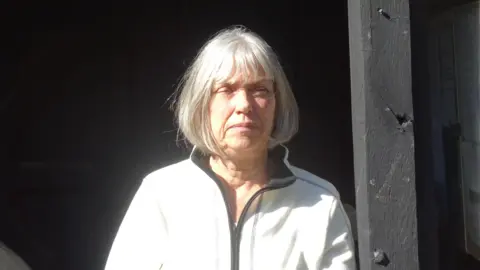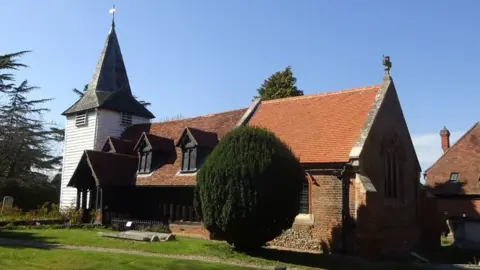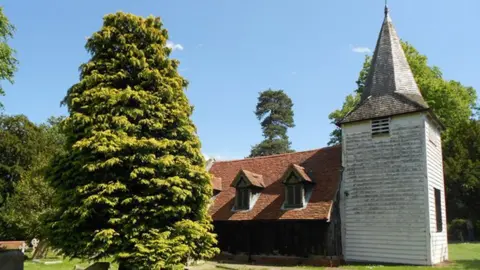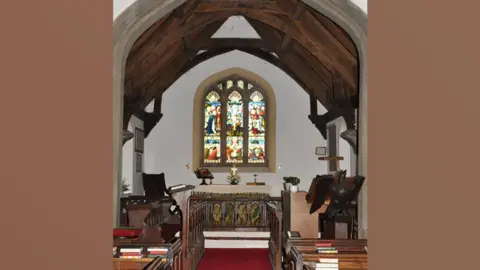Life as a guide at 'world's oldest wooden church'
 Jacqueline Eykelbosch
Jacqueline EykelboschEvery year, the world's oldest wooden church attracts about 12,000 people from all over the globe, who learn about its impressive legacy from two dedicated volunteer guides.
The timbers of St Andrew's, Greensted, near Chipping Ongar, date back to the reign of Edward the Confessor (1042 to 1066), according to Sheffield University experts.
The Essex church has a unique stave construction - and a connection to England's former patron saint St Edmund, as well as to the early trade unionists, the Tolpuddle Martyrs.
"It's amazing that it's survived all this time without being replaced with a stone church," said guide Jacqui Eykelbosch.
"I enjoy meeting people, I've always been interested in English history - and I just want to tell people what I've found out - and people say I'm very enthusiastic," she said.
 Jacqueline Eykelbosch
Jacqueline EykelboschMost churches in the Saxon era were made from wood and later replaced with stone buildings.
New Zealand-born Mrs Eykelbosch, who has lived in Greensted for nearly 30 years, said: "We know the current church was built by Saxon Hamo Dapifer in about AD1060, so before the Norman Conquest, and by the time of the Domesday Book (1086), Greensted manor belonged to him.
"The chancel [eastern end at the altar] is Tudor now, with flint and brick, while the vestry tower [used as an office and for changing into ceremonial vestments] is a mix of 14th and 17th Century weather board."
Grade I listed Greensted is famous for the stave (vertical wooden planks) construction used in its walls, which Historic England describe as a unique survivor in this country. About 30 such stave churches can still be found in Scandinavia.
It was revealed to be the world's oldest wooden church - and the oldest stave-built timber building in Europe - after experts from Sheffield University used tree-ring dating to analysis of the timbers at the request of Essex County Council, she said.
There are 51 timber planks in all.
 Nigel Cox/Geograph
Nigel Cox/GeographThe wall timbers have survived so long because when they were found to be rotting in the ground in 1848, vicar the Rev Philip Ray organised their restoration.
They took out the logs, built a brick sill and put back the timbers resting on the bricks, explained Mrs Eykelbosch.
The origins of a church in Greensted may actually go back much further, to the revival of Christianity in Essex, thanks to missionary St Cedd from AD653.
"A team of archaeologists excavated the chancel in 1960, and they found traces of post holes, so there was an earlier church on the site," said Mrs Eykelbosch.
This was reputed to be a resting place of St Edmund's body in 1013 on its way to Bury St Edmunds, Suffolk. He was killed by Vikings in AD869.
 Lynda Poulter/Geograph
Lynda Poulter/GeographMany of the visitors, who come from "all around the world", are also keen to hear more about the link to the Tolpuddle Martyrs.
These were the six leaders of a trade union set up in 1834 for Dorset farm labourers, who were sentenced to seven years' transportation to Australia for taking an oath of secrecy.
After an outcry, they returned to England three years later, moving to Essex.
Mrs Eykelbosch said: "They were given farm tenancies at Greensted - and in 1839 one of them, James Brine, married Elizabeth Standfield, the daughter of another martyr in our church."
The church also continues to have a very active congregation, with services every week.
"Historic England have us as one of the top 100 sites to visit and in the top 10 for faith and belief, alongside cathedrals like Canterbury and Westminster Abbey, so while it may be a little church, we're up there with them," she said.
Follow Essex news on BBC Sounds, Facebook, Instagram and X.
